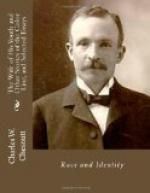And now, having thus robbed the Negro of every political and civil right, the white South, in palliation of its course, makes a great show of magnanimity in leaving him, as the sole remnant of what he acquired through the Civil War, a very inadequate public school education, which, by the present program, is to be directed mainly towards making him a better agricultural laborer. Even this is put forward as a favor, although the Negro’s property is taxed to pay for it, and his labor as well. For it is a well settled principle of political economy, that land and machinery of themselves produce nothing, and that labor indirectly pays its fair proportion of the tax upon the public’s wealth. The white South seems to stand to the Negro at present as one, who, having been reluctantly compelled to release another from bondage, sees him stumbling forward and upward, neglected by his friends and scarcely yet conscious of his own strength; seizes him, binds him, and having bereft him of speech, of sight and of manhood, “yokes him with the mule” and exclaims, with a show of virtue which ought to deceive no one: “Behold how good a friend I am of yours! Have I not left you a stomach and a pair of arms, and will I not generously permit you to work for me with the one, that you may thereby gain enough to fill the other? A brain you do not need. We will relieve you of any responsibility that might seem to demand such an organ.”
The argument of peace-loving Northern white men and Negro opportunists that the political power of the Negro having long ago been suppressed by unlawful means, his right to vote is a mere paper right, of no real value, and therefore to be lightly yielded for the sake of a hypothetical harmony, is fatally short-sighted. It is precisely the attitude and essentially the argument which would have surrendered to the South in the sixties, and would have left this




